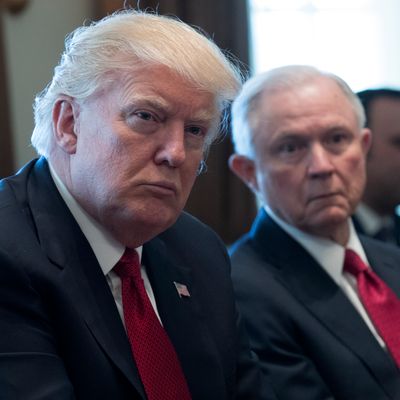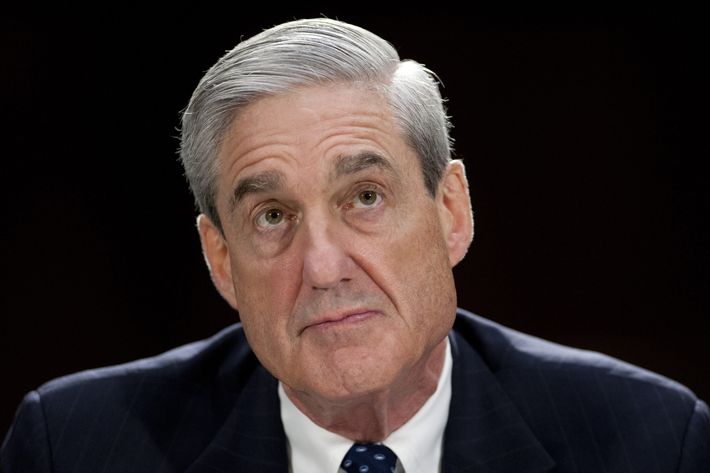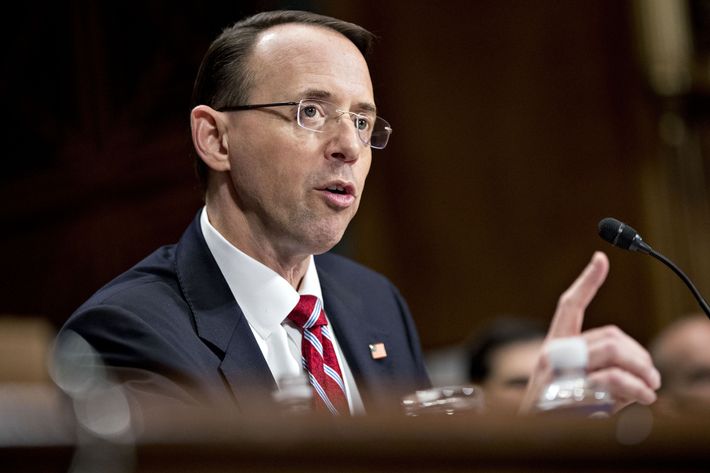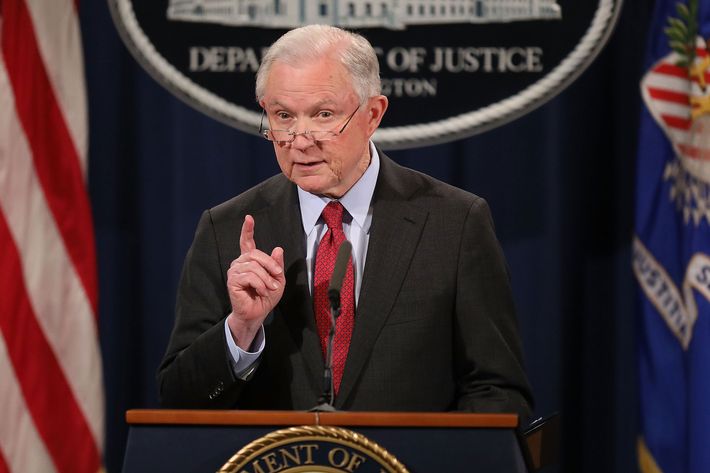
For the past few weeks we’ve been waiting to see which top official President Trump would fire next, but to the likely relief of Scott Pruitt, Monday’s FBI raids on Trump’s longtime attorney Michael Cohen shifted the conversation. Trump is obviously quite irate, and now he’s said to be considering firing someone tied to Special Counsel Robert Mueller’s investigation. But who should it be? Mueller himself? Deputy Attorney General Rod Rosenstein, the man who appointed him? Or perhaps Attorney General Jeff Sessions, whose surprising refusal to do Trump’s bidding started this whole mess?
Even Republicans are warning Trump that retaliating against any Justice Department official will only create a bigger mess. On the other hand, it’s hard to see how this situation ends without a torrent of firings. Here are the likeliest targets of Trump’s rage, and the consequences for finally giving them the boot.
Special Counsel Robert Mueller

Why Trump Is Angry at Him: Last summer Trump told the New York Times that Mueller’s investigation would cross a red line if it moved beyond Russia’s 2016 election interference and started digging into his family’s finances. “I think that’s a violation. Look, this is about Russia,” Trump said.
Since then, there’s been a steady drip of reports about the special counsel probing everything from Trump’s business to how his son-in-law’s foreign ties might have influenced policy. The New York Times reported that the FBI agents who raided Cohen were searching for records on payments to two women who claim they had affairs with Trump long before his presidential run, which certainly crosses his red line. Mueller didn’t orchestrate those searches; he merely referred the matter to the U.S. Attorney’s office in Manhattan, but that nuance was lost on Trump. He and Cohen reportedly believe Mueller is using New York’s prosecutors as his proxy.
Or, to put Trump’s gripes in much simpler terms, “Attorney-client privilege is dead!” “A TOTAL WITCH HUNT!!!”
Evidence That Trump Will Try to Fire Him: It appears Trump’s already tried it — twice. Months ago, we learned that the president ordered Mueller’s firing last summer, but his attempted Saturday Night Massacre flopped when White House counsel Don McGahn threatened to resign.
On Tuesday night, the Times reported that Trump tried to fire Mueller again in early December. That incident was triggered by reports that Mueller had subpoenaed information about his business dealings with Deutsche Bank. Trump backed down when his lawyers learned that the stories were not accurate:
Mr. Trump’s lawyers, who have studied Mr. Trump’s bank accounts, did not believe the articles were accurate because Mr. Trump did not have his money there.
The lawyers were also able to learn that federal prosecutors in a different inquiry had issued a subpoena for entities connected to the family business of Mr. Trump’s son-in-law, Jared Kushner. The news outlets later clarified the articles, saying that the subpoena to Deutsche Bank pertained to people affiliated with Mr. Trump, who was satisfied with the explanation and dropped his push to fire Mr. Mueller.
Trump raised concerns that he’s thinking of firing Mueller (again) when he discussed the possibility during an unrelated meeting on Monday. “We’ll see what happens. Many people have said, ‘You should fire him.’ Again, they found nothing and in finding nothing that’s a big statement,” Trump told reporters, adding that Mueller’s team is biased and has “the biggest conflicts of interest I have ever seen.”
Can He Do That? Probably not, but that might not stop him. When Rosenstein appointed Mueller, he pointed to a Justice Department regulation that says the special counsel can only be fired by the attorney general, and only for misconduct. The general thinking is that Trump would have to order Rosenstein to fire Mueller, since Sessions has recused himself. The deputy AG has said he’ll abide by those rules, so Trump would have to follow in Nixon’s footsteps and keep firing Justice Department officials until he found someone willing to comply.
However, Jack L. Goldsmith, a Harvard Law School professor and former head of the Office of Legal Counsel in the Bush administration, told the Times that Trump may be able to make a case for firing Mueller directly.
“I agree that the proper and most legally sound route would be to order Rosenstein to dismiss Mueller and then fire him if he doesn’t comply,” Goldsmith said. “That is clearly the right way under the law. That is the right way under the precedents. And that would be the legally safer way to do it. But there is an argument that he could do so directly and that question has never been tested in a context exactly like this.”
During Tuesday’s White House briefing, press secretary Sarah Huckabee Sanders suggested Trump may try to fire Mueller himself, saying, “We’ve been advised that the president certainly has the power to make that decision.”
What That Would Accomplish: Not what Trump thinks it would. Is it possible that congressional Republicans would shrug off a constitutional crisis? Sure. But as Vox notes, Mueller isn’t working alone: there are 17 prosecutors in the special counsel’s office, at least two grand juries, multiple live indictments, and several people awaiting sentencing.
Nixon managed to fire Special Prosecutor Archibald Cox, but his team ultimately continued its work. Trump could try to go after lower-level federal prosecutors too, but that would set off an unprecedented legal and political crisis, and presumably any dirt he’s trying to conceal would quickly be leaked.
Deputy Attorney General Rod Rosenstein

Why Trump Is Angry at Him: Under fire for facilitating the dismissal of FBI director James Comey 11 months ago, Rosenstein turned around and appointed Mueller to serve as special counsel. Trump has reportedly been raging at Rosenstein intermittently for months, claiming that he’s from Baltimore, and thus must be a Democrat (he’s actually a Republican from Philadelphia).
Rather than reining in Mueller, Rosenstein has allowed his investigation to expand, prompting Trump to publicly attack the deputy AG on several occasions. Since the Comey incident Rosenstein has attempted to demonstrate that his loyalties lie with the law, not Trump. He made that point dramatically when he personally signed off on the FBI’s decision to raid Cohen’s offices.
Evidence That Trump Will Try to Fire Him: Rosenstein’s job has been at risk for some time, but on Tuesday night CNN reported that the idea “gained urgency” following the Cohen raid. While there’s division within Trump’s team, some of his legal advisers say they now have a stronger case against the deputy AG:
They believe Rosenstein crossed the line in what he can and cannot pursue. And they consider him conflicted since he is a potential witness in the special counsel’s investigation because he wrote the memo that justified firing former FBI Director James Comey. The legal advisers also believe they have successfully argued to the American public that the FBI is tainted and think they can make the same case against Rosenstein.
Can He Do That? Yes, as a presidential appointee, Rosenstein can be dismissed without cause.
What That Would Accomplish: Firing Rosenstein might be Trump’s best option for reining in Mueller, though it’s still highly risky. In the event of Rosenstein’s dismissal, Solicitor General Noel Francisco would assume supervision of the Mueller probe. If Francisco refused to comply, Trump could keep firing Justice Department officials until he found someone who would.
There may be an easier route. Under the Vacancies Reform Act of 1998, which Trump has already used in other agencies, he could appoint anyone who’s already been confirmed by the Senate to serve as acting deputy attorney general, until the Senate approves Rosenstein’s permanent replacement. That would likely spark a legal battle, as it’s unclear whether the law applies to officials the president fires.
Once Trump put a loyal deputy AG in place, the savviest move would be to have him or her gradually undo Mueller’s investigation rather than firing the special counsel, as Louis Seidman, a constitutional law professor at Georgetown University, told the Post:
Trump moves someone in to replace Rosenstein, Seidman theorized when we spoke in February, “and that person would then say, ‘You can’t subpoena the president, and what’s more you can’t investigate his financial holdings.’”
Reached Tuesday evening, Seidman further suggested that Rosenstein’s replacement could reel in the authority that Mueller already had been granted. If Rosenstein said Mueller could dig into Trump’s real estate transactions, his replacement (say, Pruitt, for the sake of argument) probably could make those areas off limits. Pruitt could refuse to sign off on further prosecutions.
Attorney General Jeff Sessions

Why Trump Is Angry at Him: At one critical juncture, he put the rule of law above his personal loyalty to Trump. Recusing himself from the Russia probe (shortly after it was revealed that he made false statements to Congress about his contacts with Russians while serving as a Trump campaign surrogate) put Rosenstein in a position to appoint a special counsel.
Evidence That Trump Will Try to Fire Him: Trump has been publicly attacking his AG since July, when he said he wouldn’t have hired Sessions if he knew he was going to recuse himself, and called the decision “very unfair” to him personally.
In his comments on the Cohen raid, Trump reiterated this point in perhaps the strongest terms yet, saying the “attorney general made a terrible mistake” when he gave up control of the Mueller probe.
“When he did this and when he recused himself,” Trump said, “We would have used a — put a different attorney general in. So he made what I consider to be a very terrible mistake for the country.”
While Sessions has weathered many near-firings, a Republican close to the White House said that following the Cohen raid, Trump may finally pull the trigger. According to Vanity Fair:
“He’s sitting there bitching and moaning. He’s brooding and doesn’t have a plan,” a Republican close to the White House said last night. “I could see him having a total meltdown and saying, ‘Fuck it, I’m firing all of them,’” a Trump friend told me. “This is very dry tinder. If someone strikes a match to it, you could see it catching fire,” added a former official.
Can He Do That? Yes. As Sessions once put it: “I serve at the pleasure of the president. I’ve understood that from the day I took the job.”
What That Would Accomplish: While Trump has every right to fire Sessions, the politics around replacing him are a much trickier thing. For starters, Trump’s repeated efforts to fire the AG are reportedly part of Mueller’s investigation, so following through could open him up to new allegations of obstruction of justice.
The move could spark a huge backlash from both parties in the Senate. While Democrats would be up in arms about any effort to curtail Mueller’s investigation, Republicans have made it clear that they stand by their former colleague and have little interest in quickly confirming a replacement AG.
In the interim, the deputy AG would usually take over, but putting Rosenstein at the top of the Justice Department wouldn’t do Trump any good. He could use the Vacancies Reform Act to name another temporary replacement — perhaps Pruitt, who’s been campaigning for the job — but that could spark a legal battle, depending on whether Sessions quit or resigned.
It’s always possible that Trump will decide to fire everyone in a fit of anger, but at this point it’s hard to see how he could dial back the Mueller investigation without making the situation far worse.
Two people close to the White House told Politico that while Trump may be fuming more than usual, they aren’t aware of any concrete plans to oust top Justice Department officials.
“I would be very, very surprised if you saw any type of DOJ or Mueller shakeup at the direction of the president,” said one Republican. “I think the president has a sense that it would be very difficult to do it and to follow up with other appointments that would get Senate attention.”






























